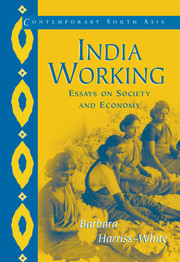Book contents
- Frontmatter
- Contents
- Preface and acknowledgments
- List of maps, figures and tables
- Glossary
- Abbreviations
- 1 Introduction: the character of the Indian economy
- 2 The workforce and its social structures
- 3 Indian development and the intermediate classes
- 4 The local State and the informal economy
- 5 Gender, family businesses and business families
- 6 India's religious pluralism and its implications for the economy
- 7 Caste and corporatist capitalism
- 8 Space and synergy
- 9 How India works
- 10 Postscript: proto-fascist politics and the economy
- Appendix 1 Liberalisation and Hindu fundamentalism
- Appendix 2 Relations between the developmental State and the intermediate classes
- Appendix 3 Roles of religious minorities in the Indian economy
- References
- Index of names
- Index of places
- Index of subjects
Appendix 1 - Liberalisation and Hindu fundamentalism
Published online by Cambridge University Press: 06 July 2010
- Frontmatter
- Contents
- Preface and acknowledgments
- List of maps, figures and tables
- Glossary
- Abbreviations
- 1 Introduction: the character of the Indian economy
- 2 The workforce and its social structures
- 3 Indian development and the intermediate classes
- 4 The local State and the informal economy
- 5 Gender, family businesses and business families
- 6 India's religious pluralism and its implications for the economy
- 7 Caste and corporatist capitalism
- 8 Space and synergy
- 9 How India works
- 10 Postscript: proto-fascist politics and the economy
- Appendix 1 Liberalisation and Hindu fundamentalism
- Appendix 2 Relations between the developmental State and the intermediate classes
- Appendix 3 Roles of religious minorities in the Indian economy
- References
- Index of names
- Index of places
- Index of subjects
Summary
The BJP has gained power despite antagonism between its political agenda and the economic interests of its support base. The concentration of BJP support among groups constituting the old intermediate classes has been difficult to avoid noticing: ‘Small industrialists and businessmen, traders and employees in the lower ranks of the professions and civil service, i.e. the petty bourgeoisie’ (Bose 1997, p. 1118). It is certainly not everywhere (Hansen 1998) and not completely, but it is quite systematically spreading through India's territory. Hindutva is the Hindu nationalists' philosophy of politics; it ‘is a unifying principle which alone can preserve the unity and integrity of our nation. It is a collective endeavour to protect and re-energise the soul of India, to take us into the next millennium as a strong and prosperous nation.’ Hindutva has been one of the two ideological responses of this fraction of capital to a pincer movement. One arm of the pincer takes the form of a globalised secularism that has been intensified by liberalisation and new waves of capital in the economy. The other arm is the result of ‘the upward thrust of the hitherto underprivileged’ in the political domain (Aloysius 1994, p. 1451). Hindutva can then be seen as an ideological cover behind which the classes of the era of the intermediate regime are buckling under the strains imposed by a globalising capitalist economic structure. Swadeshi is the other ideological response.
- Type
- Chapter
- Information
- India WorkingEssays on Society and Economy, pp. 256 - 257Publisher: Cambridge University PressPrint publication year: 2002



